11 Signs and Symptoms of PTSD
Do you recognize any of the signs and symptoms of PTSD in your life or in someone you love?
Post-Traumatic Stress Disorder, or PTSD, is a mental health condition which can develop after someone has experienced or witnessed a very stressful or traumatic event, such as a violent assault, robbery, accident, or sudden death of a loved one. PTSD can also occur after a person sees something traumatic happen to others, like a natural disaster, violent crime, or terrorist attack.
With PTSD, the sufferer’s thinking or emotions are disrupted by the event to the degree it impacts their everyday life. Intrusive thoughts and recollections of the trauma and being on edge combine, producing difficulty concentrating, intense negative emotions, and complications interacting with others.
What signs and symptoms should you look for?
The most well-known signs of PTSD are flashbacks and nightmares. These and other symptoms tend to surface when a person hasn’t adequately processed the traumatic event they experienced. The trauma keeps coming back to mind, causing more distress, and can feel as if it is happening all over again.
Symptoms of PTSD usually begin shortly after the trauma but may sometimes take years to develop. They can be triggered by words, objects, feelings, people, or events reminiscent of the traumatic experience.
Here is a list of 11 of the most common signs and/or symptoms of PTSD—
- Flashbacks, hearing, seeing, or physically feeling the events as if it is actually occurring again
- Nightmares, or flashbacks while asleep
- Recurring frightening images or thoughts of the experience, producing emotions similar to those felt around or during the event.
- Avoidance of places, events, or things which remind the person of the trauma
- Avoidance of thoughts or feelings connected with the trauma
- Detachment from life, decreased motivation, relational distance or isolation
- Nervousness, easily startled, tense feelings
- Irritability, easily agitated, angered, frustrated
- Restlessness, edgy, pacing, tapping, hard to sit still, muscle tension, tremor, twitching
- Memory, concentration or attention issues
- Negative self-defeating thoughts, distorted views of self, others, God; distorted feelings of guilt or self-blame
Experiencing any combination of these symptoms after a traumatic experience or event can be terrifying. At Honey Lake Clinic we understand—and we can help.
PTSD is complicated, with dangerous physical and psychological consequences if not treated properly. But be encouraged. The very good news is that PTSD is treatable, and the prognosis is good for those who seek help.
You may be thinking, “I can’t erase the past, so what can I really do about this?” While you cannot go back and undo events that have happened in the past, you can change the way you store them and how you react to and feel about them going forward.
At Honey Lake Clinic, our staff, licensed therapists, psychologists, and psychiatric specialists have expertise in assessing and experience in treating PTSD. Our multifaceted approach, involves healing of your mind, body, and spirit. This holistic approach will help you heal.
Fear not, for I am with you; be not dismayed, for I am your God; I will strengthen you, I will help you, I will uphold you with my righteous right hand.
Isaiah 41:10




